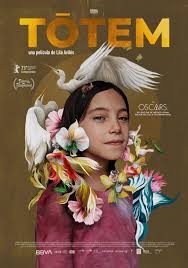TOTEM
Mexico, 2023, 95 minutes, Colour.
Naima Senties, Montserrat Maranon, Marisol Gase, Saori Gurza, Matteo Garcia, Teresa Sanchez.
Directed by Lila Aviles.

An engaging film full of humanity. It was the winner of the Ecumenical Prize (from a combined Catholic and Protestant Churches’ Jury) at the Berlin film Festival, 2023.
This is a Mexican film, written and directed by Lila Aviles with great sensitivity. The principal appeal is that the main focus is on a seven-year-old, Sol (short for Solecito). She is played so well by Naima Senties. We spend much of the film watching her, so expressive, so full of life, moments of happiness, moments of sadness, which means that we watch the adult world through her eyes.
Sol has a young mother, enjoys being with her mother, joking, making wishes – especially a wish that her father would not die. And this means that there is an air of melancholy underlying the good humour of the film. Tona, her father, has terminal cancer, is cared for at home by a maternal nurse, supported by his sisters and their children, and his elderly therapist father who needs an electro-larynx to speak and communicate and who spends his spare time with bonsai tree art.
In fact, the action of Totem takes place over a couple of hours. The plan is to hold a birthday party for Tona, one sister, Nuri, cooking, baking and decorating the birthday cake, wonderfully caring for her little daughter, Esther, who can be full of pleasant mischief, but also drinking. The other sister, Alejandra, with two older children, is bossiness personified, even spending much needed money for Tona’s medical care, to invite in a woman who will go through rituals to cast out any evil powers.
We get to know so many of the members of the family rather well, liking some, wary of others. But, all the time, we are with Sol, wanting to see her father but his not being ready, so frail, struggling at times to walk, needing constant attention. When, eventually, she goes in to see her father with her mother, there is such joy for all of them.
Sol is an intelligent little girl, able to comment on adult themes about how the world ticks. She knows about birds (and her father gives her a beautiful gift of a large painting of her favourite birds), she plays with the insects, snails and ants, is observant.
Then the guests arrive for the party, so many of Tona’s friends from school days, extended family, Latin American party full of verve. There are some performances, some joking, and a wonderful scene where Sol is on her mother’s shoulders, a large cloak concealing her mother and Sol lip syncing and gesturing to an operatic aria – to the delight of all at the party and to the cinema audience.
While the film is something of a joyous hymn to life, it faces squarely the realities of illness and death. And we, the audience, respond to both but our awareness enhanced by our liking for and our sympathies with Sol and her childlike responses.
- Mexican life? The middle class? Families, friends, the party, illness and death?
- The Mexican settings, the opening in the toilet, driving the car, under the bridge and the wishes, arriving at the? The house, the rooms? The kitchen? Tona and his room? The celebration of the party? The musical score?
- Sol and her mother, the toilet intimacy, under the bridge, the wishes, Sol wishing her father not to die? Sol, at seven, the bond with her mother, the love for her father, close-ups, her perspective on everything and everyone, the audience sharing it, charmed by her, interpreting people and events through her?
- The household, the house, the rooms and corridors, the kitchen, common rooms, the outside for the party? And his illness, his room, his weakness, Cruz and her care for him, gentle, and not being paid on time, salvaging his paintings and smuggling them out? His struggles, walking, shower, getting dressed? Constant care?
- The household, the sisters, Nuri, short hair, severe, yet loving with Esther, her treatment of her? Doing the shopping, banking the cake, the fire? Her drinking? Awkwardness, not going to the party, staying in the kitchen?
- Alejandra, husband, the kids, the phones, getting them to work, cleaning the carpet? Her bossing us? Getting the woman to cleanse the house? Using the funds Tona’s health? Getting the work done, organising, the clash with her sister, their fighting?
- Sol’s mother, the theatre, her look, the nose ring, arriving, going to see Tona, Sol and her joy, the painting of all the birds, her explanations for her father, the embraces, happiness? Her gift and his response?
- The father, age, loss of voice, electro-larynx to communicate, the therapy session? His working with the bonsai, trimming the trees? His talk with his son, working on the tree for years, the gift to his son? His retreat?
- The crowd arriving, the elderly couple and the session with the visitor, the psychic communion? The friends from school days, extended family?
- The joy of the party, Tona eventually arriving, his having to go back, toilet, but his joy with the crowd, their acclaim, their happy memories, his winning the contest at school as the most handsome?
- The performances, the singing and dancing, the speeches? Sol, the preparation with her mother, on her mother’s shoulders, the cloak covering the mother, lip syncing, the gestures, everyone enjoying the performance?
- The audience being with Sol, her play, with Esther, with the aunts, playing with the snails, on the picture, the ants, her knowledge, the question about the end of the world, her father’s gift and her being with him? Her observing the guests?
- The finale, indication of death, acceptance of death, the credits glimpse and the aftermath, the empty bed, the scorpion…?